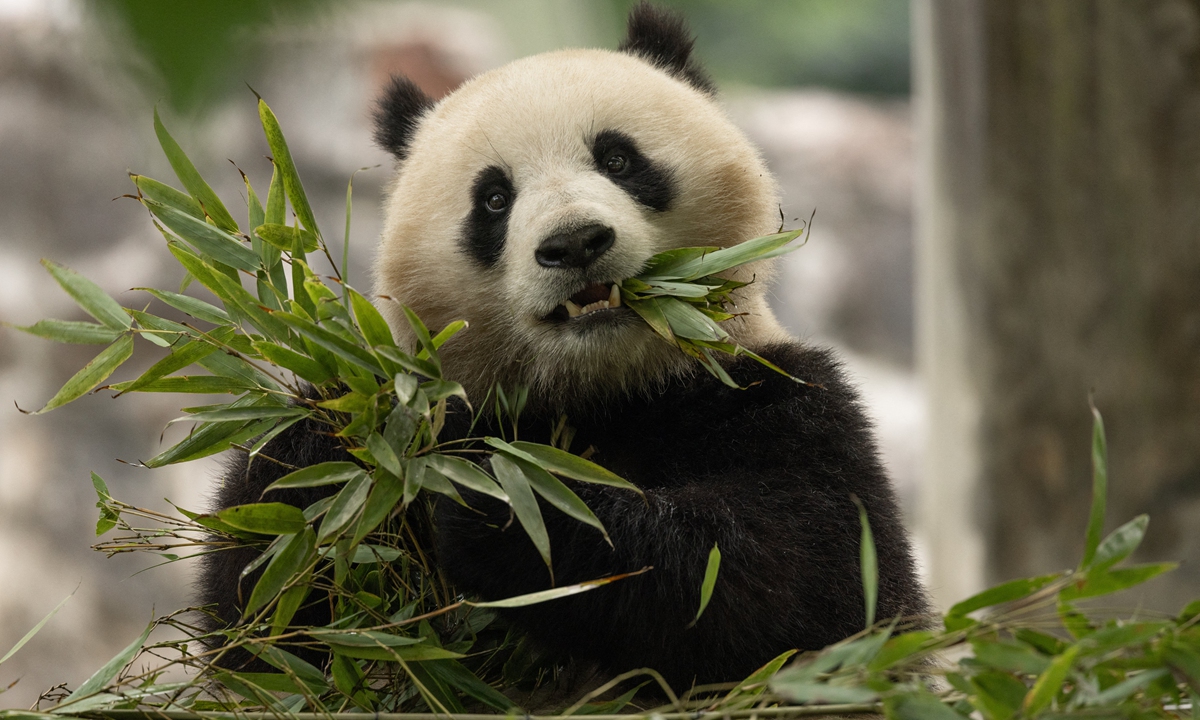New pair of giant pandas to return to Washington DC
Pour in new impetus to people-to-people exchanges

A photo obtained on May 29, 2024 courtesy of Smithsonian's National Zoo and Conservation Biology Institute shows two-year-old giant panda Qing Bao in her habitat at Dujiangyan Base in Sichuan, China.Photo:AFP
Giant pandas are returning to Washington DC! Panda enthusiasts from both China and the US are excited about the news, with many looking forward to the pandas returning to the US capital to pour in new impetus to people-to-people exchanges between the two nations.
"I hope they will like their new homes," an X user posted under a tweet of Xie Feng, the Chinese Ambassador to the US who was present at Wednesday's media event at the Smithsonian's National Zoo.
The news of the giant pandas returning to the US capital became a trending topic on China's social media platform Sina Weibo on Thursday, with many netizens expressing their hope that the pair will be well taken care of in the US.
The pair, Bao Li and Qing Bao, will travel to their new home at Washington's National Zoo by the end of the year.
Bao Li, a 2-year-old giant panda, is the grandson of Mei Xiang and Tian Tian who were previously housed at Smithsonian's National Zoo. The grandparents came back to China last year with their baby Xiao Qi Ji. The female panda, Qing Bao, is also two years old.
Ambassador Xie said he is sure that Bao Li and Qing Bao will have a healthy and happy life at the National Zoo, which is currently renovating the Panda House to give pandas more space to exercise, eat, play and relax.
In a social media post by the National Zoo, zoo official Brandie Smith referred to the panda conservation and research program launching with China as "one of our biggest conservation success stories."
In an interview with China News Service, Smith stated that in preparation for the arrival of the pandas, the zoo is actively making arrangements, including renovating and upgrading the panda enclosures, replacing fences and adding more climbing structures.
Currently, the panda keepers at the Washington National Zoo have begun communicating with their Chinese counterparts to understand the preferences of the two pandas, according to Smith.
Now, with this latest round of panda conservation cooperation as China and the US mark the 45th anniversary of diplomatic ties, American friends will get to see pandas more often, Xie said. Apart from Bao Li and Qing Bao, Yun Chuan and Xin Bao will head to the San Diego Zoo.
In his speech, Ambassador Xie said even before China and the US established diplomatic relations, the bilateral cooperation on panda conservation had already begun. He encouraged everyone to care for China-US relations just as they care for pandas, and jointly usher in a peaceful and prosperous future.
The return of the giant pandas to Washington will encourage panda lovers from both countries to engage more, enabling the animals to continue fostering emotional connections between the two nations, Zhao Songsheng, manager of YueWeiLai, a Chengdu-based NGO dedicated to protecting giant pandas, told the Global Times.
In this process, young people, or parents with children, will not only see the pandas but also develop a deeper knowledge and understanding of pandas, as well as an interest in various aspects of Chinese culture. Through the gateway of pandas, people can gain a deeper understanding of Chinese culture as well, Zhao said.
The current round of cooperation will focus on prevention and treatment of major diseases, and protection of habitats and wild giant panda populations, according to Ambassador Xie.
Liu Dingzhen, a professor from the College of Life Sciences, Beijing Normal University, told the Global Times that collaborating with the US is a crucial aspect of the China Wildlife Conservation Association (CWCA) in the international cooperative breeding of giant pandas in captivity and wild population conservation.
Technical experts from both countries can share resources and conduct research to improve giant panda breeding, disease prevention and treatment, and public education. All this can enhance China's National Giant Panda Park establishment and development.
While the word "panda" may sometimes be politicized in the West, Liu highlighted the fact that the pandas themselves are universally adored animals and should not be overinterpreted. In practical terms, China's continued collaboration with the US in protecting giant pandas definitely contributes to global biodiversity conservation.
According to the CWCA, the association conducted the first round of giant panda research cooperation with the US National Zoo between 2000 and 2023. With their collaborative efforts, the zoo successfully bred four panda cubs. Meanwhile, the association and the zoo have jointly published 115 professional books and over 300 academic papers.
In February, the CWCA reached agreements with zoos in overseas countries in a new round of international cooperation for giant panda conservation, including with the San Diego Zoo in the US, according to the Xinhua News Agency. In April, the giant pandas Jin Xi and Zhu Yu took off from Chengdu Shuangliu International Airport, bound for Madrid Zoo in Spain to begin a 10-year stay.